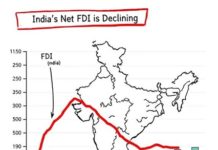MARKET PERSPECTIVE
By J Mulraj
April 13-19, 2024
Can geopolitical considerations avoid escalation of conflicts?
The use of a slingshot by David, circa 1000 BC, was, possibly, one of the first examples of asymmetric warfare. Diminutive David slew the giant Goliath with a well aimed stone hurled at his forehead.
In modern times there have been several examples of asymmetric warfare. The Vietcong used a tunnel network (as did the Gazians) to inflict casualties on a more powerful enemy. Terrorists used commercial aircraft in the 9/11 attack on the World Towers in NY. Azerbaijan used loitering munitions, aka kamikaze drones, to defeat Armenia. Ukraine, too, has used drones to defend against a far more powerful Russia.
Last week, Iran used a barrage of drones and missiles to retaliate against Israel after its attack on an Iranian consulate in Damascus killed some senior Iranian commanders. Israel, with the help of America, Jordan and UK, succeeded in intercepting some 99% of incoming projectiles. Benny Gantz , a member of the Israeli Knesset, has threatened a counter-counter attack against Iran at a time of Israel’s choosing. This fear of escalation is of great concern to investors, since it could drag the big powers into a regional conflict, turning it, possibly, into a world war.
There are two, opposing, narratives about the Iranian counter attack. Israel claims it demonstrated Israeli capability to stop incoming projectiles and to protect its land and peoples. Iran, too, claims a success, because the cost to Israel, using million dollar interceptor missiles, was far more than the cost to Iran, of drones costing a few hundred dollars. This, in essence, is asymmetrical warfare.
An excellent analysis has been done by author, investment banker and lawyer, Jim Rickards, in this video. As per his analysis, which appears credible, the attack was an orchestrated one, proposed by America, in order to stave off a bigger conflict, and agreed to by Iran, for the same reason. Iran gave advance information, enabling the defensive capabilities to be shored up, thus preventing an escalation, even as it allowed Iran to vent its bloodlust and demonstrate its capabilities to inflict damage. Rickards drew inference from the fact that the Israeli statement of intent was delivered by someone other than Netanyahu, to conclude that there may not be a further escalation. However, he was wrong, as Israel attacked Iran on Friday threatening escalation of a regional conflict.
After an initial fall on news of the attack, the BSE Sensex recovered.
Rickards makes another interesting Latino of analysis. Other countries consider Biden to be a weak leader, (as amply demonstrated by the botched withdrawal from Afghanistan, abandoning soldiers, Afghani friends/assets, and military equipment. Leaders of other major countries would, he concludes, not escalate conflicts in Middle East or Taiwan, say, in order to make chances for his re-election better. An interesting analysis. Let’s hope this one works out.
If this analysis is borne out, it would imply that geopolitical considerations can defer an escalation of conflicts.
Biden’s weakness in leadership is being demonstrated in his policies relating to energy, where he has converted the US from being energy independent, as it was under Trump, to becoming import dependent, leading to high gas prices. Or in his open borders policies, which has flooded American cities and towns with undocumented migrants. In New York they were housed in luxury hotels, ostensibly paid for using taxpayer funds ( hotels complain not having been paid for months) until recently, when the Governor ‘realized’ that state coffers were empty. Or in his student loan debt forgiveness policy (an attempt to get their votes at taxpayer expense) which actually penalizes students who have worked to pay off their debts.
The interest rate cuts investors are hoping for, are being delayed. Fed. Chair J Powell says that it’s taking longer than expected to reach the targeted 2% inflation rate. In a way he, too, is fighting an asymmetrical war with inflation. World leaders are helping prop up inflation by their energy policies and their apparent fondness for wars. No political leader of any stature is calling for a negotiated settlement of the tragic conflict in Ukraine. All turn a deaf ear to Michael Jackson’s plea in his Earth Song
“did you ever stop to notice all the blood we’ve shed before? Did you ever stop to notice this crying Earth, these weeping shores.’
After rise in tensions in the Middle East, oil prices can keep rising, with resultant inflation. This may, in fact, lead to a rate hike instead of a rate cut! A rate hike would diminish Biden’s chances for being re-elected; he trails Trump in polls anyways.
Technology is the silver lining in a landscape darkened by the inane policies of inept politicians. Iron Lev, an Italian company, has announced that it’s possible for magnetically levitated trains (Maglev) to operate on normal rail tracks, without need to build expensive infrastructure.
Should this become commercially viable, it would significantly reduce travel time and logistical costs.
Last week the BSE Sensex closed at 73088 for a weekly loss of 156 points.
The Indian stockmarket appears to have taken the latest salvo in the Middle East brouhaha in its stride. But the sad circle of retribution never ends. Besides that, the possibility of a Fed rate hike, or maybe a later than anticipated cut, since inflation runs amok, would not fare well for markets. Should circumstances compel Powell to defer the rate cuts till after the November elections, Biden may well get trumped. Amongst jingoistic world leadership, ongoing conflicts, an obdurate inflation and high interest rates eating into corporate profits, it’s hard to see the silver linings.
Picture Source: https://www.amazon.in/David-Goliath-Dragan-Kojovic-Koja/dp/B08FP7NGT6
Contact address: Jmulraj@asiaconverge.com










































COMMENTS